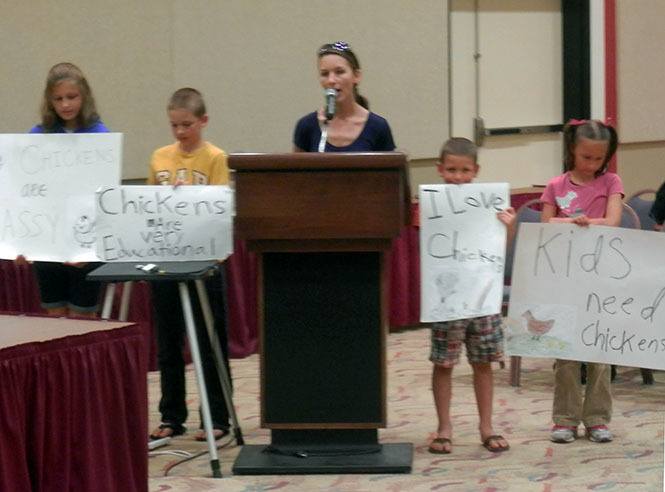Members of the Ocean Shores Planning Commission were asked to appear before the City Council Monday night to explain their decision to turn down a proposal that would have allowed a small number of chickens to be raised by residents of the city.
The Ocean Shores Planning Commission by a 4-1 vote July 26 rejected a proposed revised ordinance that would have allowed raising chickens within city limits under certain limitations.
Planning commissioners were asked to review the issue by the council and mayor after a group with 241 signatures petitioned the city to change city code governing “urban agriculture.”
The proposal would have set several conditions: a maximum of four hens on each property, no roosters, no slaughtering or egg-selling permitted. Hens also would have to be contained within a fully enclosed fence, pen or coop at all times, with the hen enclosure a minimum 10 feet from the property line.
After taking public testimony on the proposal July 21, Planning Commission members had questions about who would enforce the new regulations and requirements, and what would happen if they were violated or exceeded. Another issue is the fact that much of the property in Ocean Shores is governed by pre-existing real estate covenants, conditions and restrictions (CCRs) that specifically forbid the raising of farm animals.
Councilwoman Holly Plackett asked if other cities allowed chickens to be raised. While many did allow chickens, there were a variety of issues with enforcement and licensing, commissioners said. Seattle, for example, allows four chickens per household.
“We had to make our own decisions based on what was going to work here,” said Planning Commission Chairwoman Cathey Peterson, who contacted the cities of Tukwila and Woodinville. Commission member Jeff Daniel, a local real estate broker, noted the covenants and district by district real estate conditions and restrictions all are part of every real estate contract.
“I heard from a lot of property owners about this matter and every one of them was dramatically opposed to chickens being at a beach community,” Daniel said.
Commission member Susan Conniry suggested that if residents wanted to raise chickens, they should first go through the process of trying to change the covenants, then come back to the city to change the ordinance. City Attorney Brent Dille also suggested the council could pass an ordinance allowing chickens to be raised only in divisions or districts where the covenants allowed them.
“One of the things we all have to think about is that these covenants were done 50 or 60 years ago, and communities change, communities grow, and people’s lifestyles change,” Plackett said.
The issue will be brought back again at a future City Council meeting as a discussion item. It is unclear, however, if new language will be proposed or how the council will proceed.



